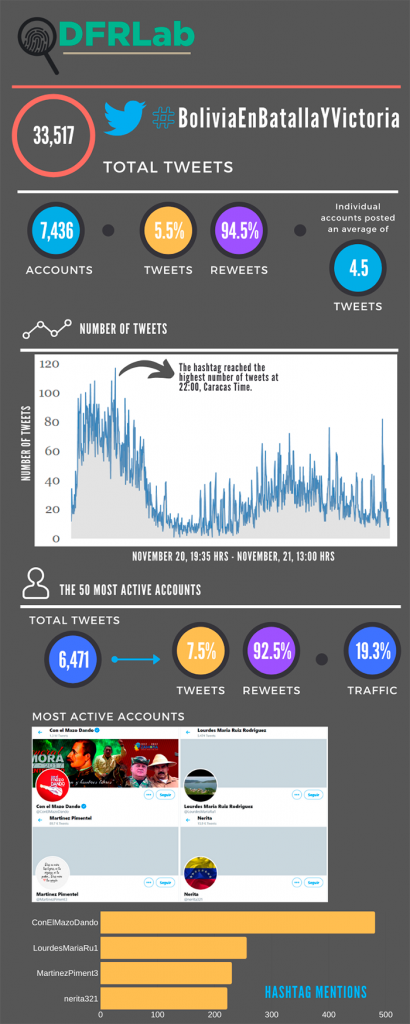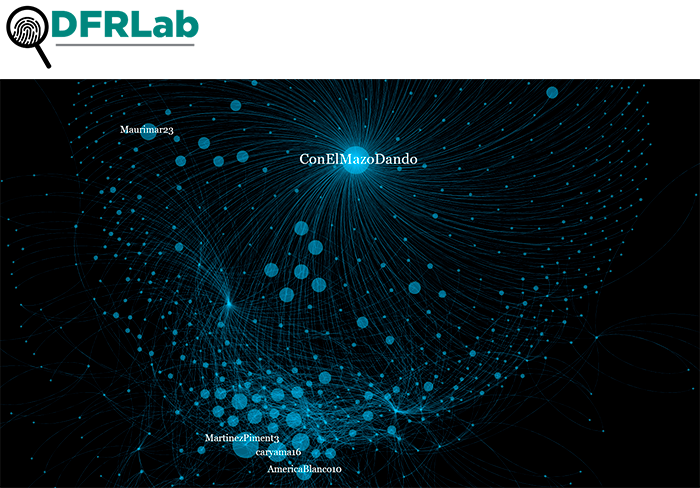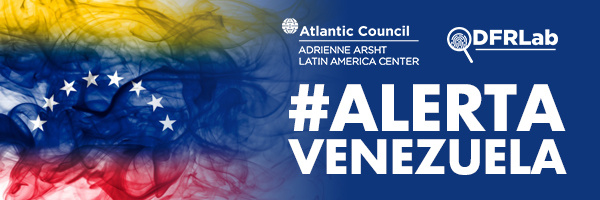#AlertaVenezuela is leading the way in identifying, exposing, and explaining disinformation within the context of one of the Western Hemisphere’s largest crises in recent history, where the fight for control of the information space will continue to pose a challenge for the region.
TOP STORY: Amid protests in Colombia, xenophobic narratives against Venezuelans take hold on Twitter
Colombia has become the latest Latin American country to engage in anti-government protests, as citizens took to the streets across the region calling for change: from marches decrying austerity policies in Ecuador and Chile to protests in Bolivia initially based on claims of fraud in the October 20 election and more recently over the perception that President Evo Morales’s resignation was forced (i.e., a “coup”).
While the protests in Colombia on November 21 were mainly peaceful, confrontations and acts of vandalism in Bogotá and Cali fueled xenophobic narratives against Venezuelans. On Twitter, some users blamed Venezuelans for looting across the cities. Over the past few years, millions of Venezuelans have fled the country as a result of the dire economic, political and humanitarian crisis. Estimates suggest over 1.5 million Venezuelans have fled to Colombia.
The DFRLab examined 286,797 tweets containing the word “Venezolanos” (Venezuelans), posted in Spanish between November 21 and November 24. Among the hashtags used in this set of posts were #Venecos (a pejorative reference to Venezuelans) and #FueraVenezolanos (“Get out Venezuelans”). Both hashtags garnered almost 2,000 mentions.
The narrative about Venezuelans in the context of the national strike began when Twitter accounts shared a video of people looting a supermarket in Bogotá. The posts suggest the looters are Venezuelans. The videos garnered 63,800 views, 760 retweets, and 1,125 likes combined.
Other posts blamed Venezuelans for acts of vandalism during the demonstrations. The user @OliverLopezCano, a young man who described himself as living in Spain because of the Maduro regime’s threats tweeted (archive) “My solidarity with the Colombian people before the vandalism attacks of thieves of the Maduro regime, Cuba, and the Forum of death.” By November 26, the post had received 702 retweets and 470 likes.
TALK OF THE COUNTRY
The article published by non-Venezuelan media about Venezuela that received the most engagement was “Expulsan de Colombia a 59 venezolanos por actos vandálicos en Bogotá” (“Colombia deports 59 Venezuelans for acts of vandalism in Bogotá”), published by the Colombian outlet El Tiempo on November 25. The article was shared roughly 10,000 times on Facebook and garnered 74,500 interactions, including shares, comments, and reactions across all public and private posts on Facebook. In total, posts referencing the article received 74,400 engagements on Facebook and Twitter combined. The piece explores the operations made in five localities of Bogotá by the Special Operations Group (GOES) after Venezuelans were captured for allegedly participating in acts of vandalism during the national strike.
The article published by a Venezuelan outlet that received the most engagement on social media was “Guaidó: Si hay que repeler al ELN a plomo, pues que sea a plomo” (“Guaidó: if we have to repel ELN by shooting, by shooting it is”) published by independent websiteLa Patilla on November 23. The article garnered 2,671 interactions, including reactions, shares, and comments. In total, the piece was shared 529 times on Facebook and received 2,700 engagements on Facebook and Twitter combined. The piece described a quote (archive) from Guaidó in an video posted by TV Venezuela.
On Facebook, RT en Español (ActualidadRT) posted “En un audio publicado por Publimetro Colombia, se conoció que el embajador de Colombia en EE.UU., Francisco Santos, ‘inventa cosas para que aquí [el congreso de EE. UU] tengan en la cabeza a Venezuela’” (“Leaked recording published by Publimetro Colombia revealed that Colombia’s Ambassador to the U.S., Francisco Santos, ‘invents stuff to keep the U.S. interested in Venezuela’”) (archive). The post, published on November 21, garnered 15,000 shares and 7,400 reactions, reaching 1,500 comments by November 26, 2019. RT’s post included an excerpt of leaked audio of a conversation between Santos and Colombia’s foreign minister-designate, Claudia Blum.
HASHTAG OF THE WEEK
#BoliviaEnBatallaYVictoria (“Bolivia in battle and victory”)
As violence gripped Bolivia following the ouster of President Morales, Diosdado Cabello, president of the Constituent National Assembly and Nicolás Maduro’s second-in-command, tweeted (archive) the hashtag #BoliviaEnBatallaYVictoria (“Bolivia in battle and victory”) on November 20. The post garnered 1,500 retweets and 1,100 likes.
The hashtag started after confrontations between troops and Morales’s loyalists in cities such as El Alto and Cochabamba left at least 23 dead and 715 injured. Morales, on November 19, described (archive) such events as a massacre of his people.
Since Jeanine Añez took office as interim President of Bolivia, thousands of Morales supporters have demanded the former leader’s immediate return, claiming that his removal was a “coup.” Protesters have also called (archive) for the resignation of Añez and for a stop to the violence against them.
On Twitter, the hashtag reached the trending topics in Venezuela on November 20 with 19,000 mentions. By November 21, it had garnered more than 30,000 mentions. The following graphic shows a set of metrics based on the activity of #BoliviaEnBatallaYVictoria.

The hashtag activity around the posts by the account @ConElMazoDando, a television show hosted by Diosdado Cabello, shows high level of amplification by accounts that were mainly retweeting such posts.

The graph above shows the links (blue lines connecting the circles) between the account @ConElMazoDando and other accounts that retweeted it the most. The size of the bubble indicates relative numbers of tweets (including retweets) using the hashtag in the overall volume of those that used it.
Outside of @ConElMazoDando, the main amplifiers of the hashtag were the accounts @MartinezPiment3, @caryama16, and @Maurimar23. These three accounts mentioned the hashtag 402 times combined, or 134 times each on average. The DFRLab considers high activity and amplification, combined with other signs such as anonymity, as indicators of automation.
OFFICIAL STATEMENTS
“La expulsion [de venezolanos que hicieron parte de las protestas del 21 de noviembre] se hace con el propósito de mantener el orden y la seguridad en todo el territorio nacional, así como preservar la imagen de aquellos venezolanos de bien, que se encuentran trabajando en nuestro país. No vamos a permitir que ningún ciudadano extranjero afecte nuestra tranquilidad. Hemos respetado su participación dentro de las marchas. Les hemos tendido la mano a aquellos, que como el pueblo venezolano, lo han necesitado.”
“The expulsion [of Venezuelans who took part in the November 21 protests in Colombia] is based on preserving safety and order in all the country, as well as the good image of Venezuelans who are in our territory… We are not going to allow any foreigner to affect our tranquility. We have respected foreigners participating in the marches. We have extended a helping hand to Venezuelans when they have needed us, but what we will not allow is for a group of delinquents to come and affect the security of our cities.” — Christian Krüger, General Director of Migration Colombia in an official statement released on November 25, after protesters in Colombia took to the streets for the national strike.
“¡Vamos con los estudiantes, vamos con el presente y el futuro de Venezuela! Hoy los estudiantes salen a las calles y nuestro llamado es a acompañarlos. La mejor reivindicación que podemos tener como venezolanos es conquistar juntos la Libertad. #EstudiantesEnProtestaSostenida.”
“Let’s go with the students; let’s go with the present and the future of Venezuela! Today the students take to the streets, and it is our call to join them. The major claim we can have as Venezuelans is to conquer freedom together.” — Juan Guaidó tweeted (archive) on November 21, after students organized a march in Venezuela, using the hashtag #EstudiantesEnProtestaSostenida (“Students in sustained protest”).
RECENT ANALYSES
Amid the crisis in Bolivia, a Twitter flood of coup denial, bot accusations, and memes
Amid the disagreement on whether former Bolivian President Evo Morales’ recent ouster was a coup or the will of the Bolivian people, a group of 1,435 Twitter accounts pushed anti-Morales and coup-denying messaging. Some investigators alleged that these accounts were part of a large-scale bot operation.
Sorting fact from fiction about the crisis in Bolivia
After 13 years as President of Bolivia, Evo Morales resigned on November 10, 2019. The decision followed three weeks of protests in the country due to fraud allegations in the October 20 elections.
For some, Morales’s resignation has been labeled a “coup” by those that saw the pressure of the military as pivotal in the decision or that Morales was forcibly removed as a democratically elected president, presuming the most recent elections were legitimate. For others, it was regarded as a victory for democracy by those that saw Morales’s government as increasingly authoritarian or illegitimate.
DFRLab and ACLatAm IN THE NEWS
Jason Marczak, director of the Atlantic Council’s Adrienne Arsht Latin America Center, was quoted on the protests that took place in Colombia this week. His comments were picked up by Agence France Presse and EFE and were reprinted in outlets across the region, including Mexico’s El Economista, Brazil’s Estado de S. Paulo and ISTOE, Ecuador’s El Comercio, Peru’s MSN Peru, and nearly 200 others.
Subscribe to the #AlertaVenezuela newsletter
To receive future editions of the #AlertaVenezuela newsletter each week, sign up below!
